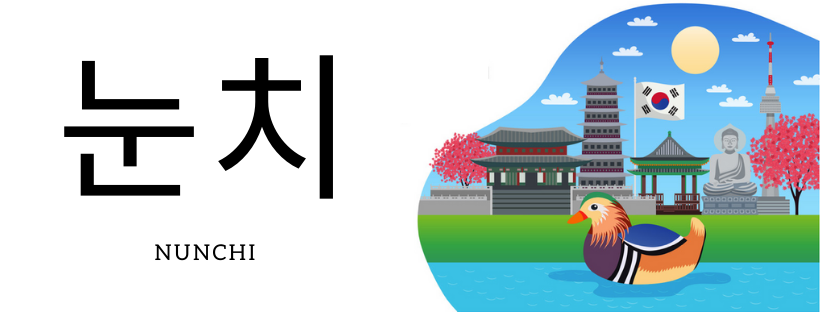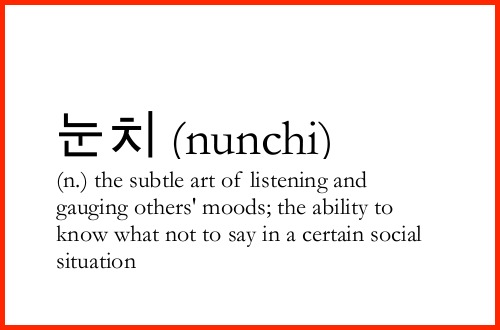Nunchi

As an aspiring polyglot and a student of neuropsychology, I have a sweet spot for untranslatable words (from foreign or historical languages) that describe emotions, psychological states and/or behaviour. Because I got so many positive reactions about my work on hiraeth, I decided to share this interest with you by means of a new category for this blog: “Lost in Translation“. This first entry will be about the Korean concept of Nunchi, as I was recently interviewed about this by journalist Annemieke Riesebos for the Dutch magazine Grazia.
Nunchi, literally translated as “eye-measure”, is a foundational Korean native social or edifying value. It denotes one’s capacity to gauge or appraise communal state of affairs and appreciate others’ purposes and feelings through implicit signals (Robertson, 2019). The concept is now popular outside of Korea because of Euny Hong’s book, “The Power of Nunchi”. That title might make you believe that Nunchi is a magic trick, but it’s more a form of paralanguage or metacommunication that offers a new way of looking at your place in relation to others. Very useful for us “Dutchies” as in the Netherlands, we are very direct, while in many Asian cultures there is far more emphasis on blending in a group of people.
As you might have expected, Nunchi relates to psychological models of social intelligence. To begin with, one can easily equate skilled nunchi with psychological models of emotional intelligence that can easily be put across as the capacity to perceive and express emotional states, integrate feelings in thought, comprehend and reason with feelings, and self-control (Lee and Baek, 2019). Thus, in psychological models, nunchi allows society to detect an assortment of matters that surround mental states and models of social intelligence. Therefore, thinking along the lines of nunchi is extremely valuable for persons with autism, who are often believed to have no “theory of mind”.
Therefore, I think that nunchi is more universal than it seems, for although we lacked a good word to describe it, all humans unconsciously apply aspects of nunchi. Think for example about a conversation in which one person is wondering what the other one is thinking and adjusting their reactions to match (and vice versa). Nunchi just goes a little further, by making these habits of tact more explicit. It contains a number of principles that you can use in your daily life, for example in work situations. It is about increasing your human knowledge in general, but I approach it as a mix of tact and responsiveness, awareness and being open to influences from your environment (and not just being busy with your own story).
That way, nunchi provides a bit of calm, focus and more attention to each other. In my opinion, these are important in this age in which we are constantly busy and becoming more and more individualistic. Think about the – in these discussions often brought up – example of the cellphone. It might be called an iPhone, with apps called iTunes and YouTube. These names are no coincidence, they tell us that it’s all about you/I aka the user.
Skilled nunchi personnel permits all the members of the society to detect several issues related to models of social intelligence, but the society may well not be exceptionally skilled at gaining an understanding and reasoning with personal feelings. Likewise, even though skilled nunchi does not relate only to indirect methods of communication, its strong connotations of ability in indirect communication differentiate it from the more comprehensive concept of social intelligence (Yim, 2017). Furthermore, this difference is subtle, in part for the reason that an individual with much Nunchi will practically have much social intelligence, and vice versa (Lee, 2015).
Apart from that, although skilled nunchi genuinely encompasses aspects that touch on expert perceptive capacities, individuals with skilled nunchi may still (un)intentionally act in an impolite manner even when the situation necessitates other approaches (Chong, 2018). Thus, one could argue that when touching on psychological models of social intelligence, skilled nunchi is not similar to civility nor does it bear any same tact.

Even though nunchi is a vital contemplation when applying socially subtle involvements and investigation, it has only lately started to fall under empirical exploration (Heo, 2016). In my opinion, further research through auto-ethnographic records of lived experiences is necessary to get a better idea of the added value of the incorporation of this subtle art, especially for people on the autistic spectrum.
References
Chong, A. (2018). Korean American Studies: Then and Now.
Heo, J. H. (2016). The relation between nunchi and the quality of life: In the moderation of affect regulation. Discourse and Policy in Social Science, 9 (1).
Lee, K., & Baek, S. Y. (2019). Association among cultural orientation, Nunchi, and interpersonal relationships with Korean adolescent athletes. Revista de psicología del deporte, 28 (2), 0067-78.
Lee, J. K. (2015). The Relationships among Competence, Clinical Practice Stress, Communication Skill & Nunchi in Nursing. Students. Unpublished master’s thesis Gyeongsang National University, Gyeongnam.
Robertson, S. (2019). Nunchi, Ritual, and Early Confucian Ethics. Dao, 18 (1).
Yim, J. Y. (2017). Nunchi, a Korean value of social intelligence, and its relationships to emotional intelligence, psychological functioning, and interpersonal problems. Biola University.
Leave a Reply